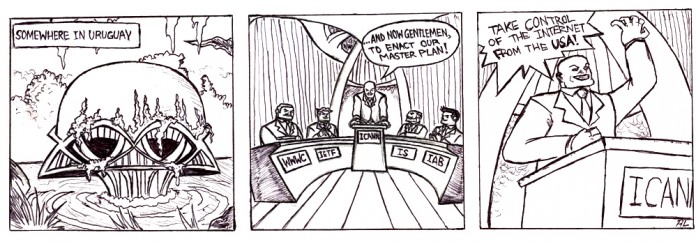Julian Levy
Illustration by Hector Lizarraga
The world’s foremost organizations responsible for the technical operation of the Internet’s infrastructure have met in Uruguay to plan for a more globalized Internet, free of the influence of the United States government.
The meeting, held in Montevideo, Uruguay, has attempted to address the growing concern for the future of the Internet and its status as a politically free and open flow of information.
The organizations attending the meeting include Internet infrastructure giants such as the World Wide Web Consortium (W3C), the Asia-Pacific Network Information Centre (APNIC), and, most notably, the Internet Corporation for Assigned Names and Numbers (ICANN).
Since its creation in 1998, ICANN has been a powerful force behind the operation and stability of the Internet. Most notably, it controls many domains including .com and .org, and it also oversees the global switch to the latest Internet protocol standard, IPv6. ICANN now also operates the Internet Assigned Numbers Authority (IANA), which manages global IP address allocation.
ICANN is an entirely U.S. organization overseen by the U.S. Commerce Department, which, in light of the NSA’s PRISM program, has left many of the world’s Internet companies especially concerned.
The Internet as it exists now is a very American affair, but what remains unclear is whether the United States can fulfill a position neutral enough to maintain a respectable and trustworthy authority over such a crucially important organization as ICANN.
In a statement released on Oct. 7, the leaders of the Montevideo meeting “called for accelerating the globalization of ICANN and IANA functions, towards an environment in which all stakeholders, including all governments, participate on an equal footing.”
Historically, countries like Brazil have rallied for this described decentralization of the Internet’s technical infrastructure, proposing that the U.N. take responsibility for ensuring an open and uncensored Internet.
Opponents of this plan claim distinct disadvantages, including the possibility of the balkanization of Internet traffic, citing instances of government censorship and telecommunications disconnections.
It is uncertain if a truly geopolitically decentralized Internet can exist, but the creator of the World Wide Web, Sir Tim Berners-Lee, seems convinced that the issue must be addressed in some way. He is quoted as saying “If you can control [the Internet], if you can start tweaking what people say, or intercepting communications, it’s very, very powerful…it’s the sort of power that if you give it to a corrupt government, you give them the ability to stay in power forever.”
Governmental forces are not the only influencing factor to be considered either. The growing privatization of the Internet by tech giants like Facebook and Google further complicates the issue.
Deepfield, an Internet traffic monitoring company, has said “Google’s various services now account for 25 percent of all Internet traffic on an average day.” Google is also moving forward with huge infrastructure projects like “Google Fiber” Internet service, further extending the likelihood of their engagement in the issue.
So far the meeting has yet to release any definite proposal to break up the United States supposed monopolization of the web. It seems likely that the struggle for the right to oversee the Internet will continue on well beyond the boundaries of Montevideo, Uruguay.











